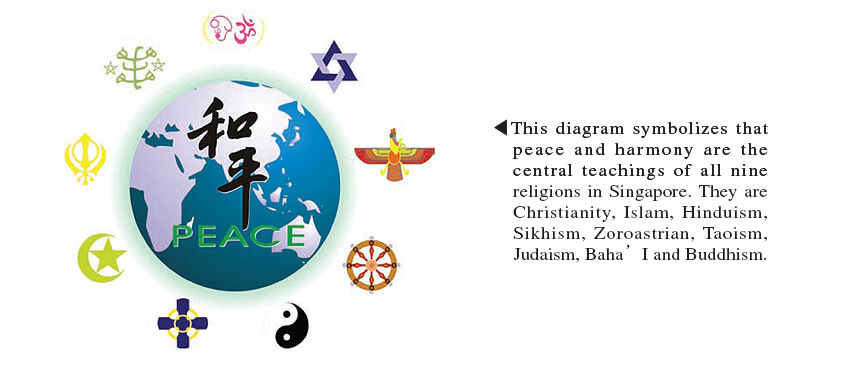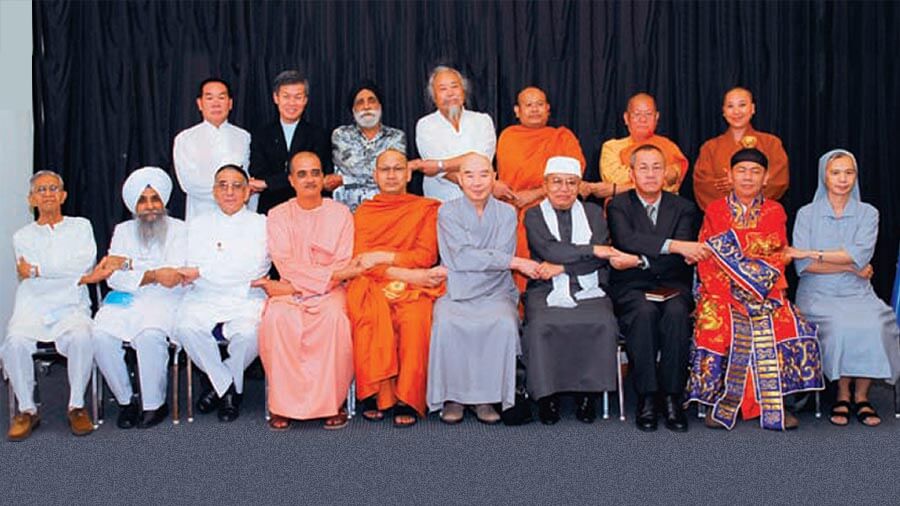By Ven. Prof. Chin Kung AM
“Forum on World Religions and the Search for Peaceful Coexistence”
National University of Singapore, January 2, 2007
Guest of Honour, Deputy Prime Minister Mr. Wong Kan Seng
Respected Deputy Director, University Scholars
Programme, Associate Professor Kang Hway Chuan,
Honourable Syed Hassan,
Distinguished religious representatives and
guests,
Good day!
It is my honour and pleasure to participate in the “Forum on World Religions and the Search for Peaceful Coexistence.” Thank you for the kind invitation. Religious cooperation, conflict reconciliation, and world peace promotion are the shared wish of all people, and particularly meaningful to Singapore. The harmonious relationship among religions in Singapore has been recognised as a good role model for the entire world over the past years. Singapore’s accomplishments received respect and admiration from ambassadors and friends of various countries at UNESCO Headquarters in October, 2006.
Over the years, I have visited President Bush of the United States, former Indonesian Presidents Honourable Wahid and Ms. Megawatti, former Malaysian Prime Minister Mahathir, and other country leaders. I have also attended nine international peace conferences. All my talks recommended reconciling conflict and promoting world harmony and stability to country leaders, experts, and scholars. In my view, reconciling all conflicts and contradictions in today’s world should start with uniting religions, which in turn will enhance the harmony and cooperation among countries, political parties, and ethnic groups, and thus reconcile conflict. These country leaders and scholars all agreed to my humble view. A particular case was Honourable Mahathir. On the very next day after our meeting, he invited me to participate in and give a keynote speech to the Perdana Global Peace Forum. This was held in Kuala Lumpur in October, 2005.
In previous world peace conferences, participants agreed to my proposed idea of promoting moral education, reconciling conflict, and promoting world harmony and stability through teaching but they believed this was an impractical ideal. In order to build the confidence of these international friends, we must show proof through experiments. Therefore, in November, 2005, we started a Cultural Education Centre in the township of Tangchi in Lujiang, Anhui Province, China, to train teachers and to promote moral education to local residents. We had hoped to see positive results in three years. However, within half a year of teaching, the centre achieved the result of awakening people’s conscience and innate goodness. The results were beyond our expectations as good social values were restored significantly. This experiment was so surprisingly successful that it exceeded our hopes and strengthened our confidence. In July, 2006, I had the privilege of being invited by Dr. Preeyanuch Jariyavidyanont, Vice Ambassador of Thailand to UNESCO, to attend the grand celebration of the 2550th birth anniversary of the Buddha under the cosponsorship of UNESCO Headquarters in Paris. I had two goals in mind when attending this activity. The first goal was to report to UNESCO that religions could work together and help each other. The best example of inter-religious harmony and mutual cooperation for world religions are the ten religions in Singapore. The second goal was to propose that to reconcile conflict and restore stability and peace, we must use the method used by Sakyamuni Buddha and Confucius and many other saints and sages—teaching.
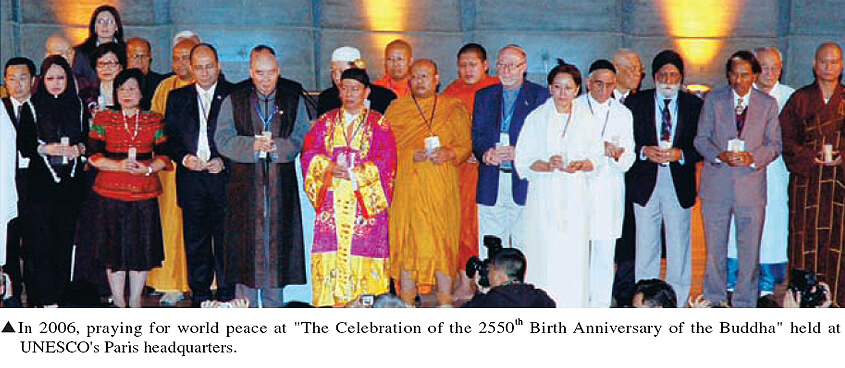
Thus, in preparing for Paris conference, we overcame various difficulties and managed to invite the representatives from the ten religions in Singapore to conduct a joint prayer for world peace on stage during the opening ceremony. At the same time, we introduced the achievement of the people in Tangchi, China, in their learning of Chinese traditional moral teaching—The Standards for Being a Good Student and Child. All religious representatives and participants listened carefully and responded well. We sincerely demonstrated to our international friends that religions can be united, and that people can be taught to be good! If we can begin with these two goals and strive to promote and practise them widely, I believe that they will be of great help to reconciling all conflicts and promoting social stability and world peace.
I had a dinner with the Vice Ambassador of Thailand after the conference. She and her peers were very pleased with this conference and praised the excellent program, saying that the orderly and harmonious atmosphere of the conference was unprecedented. It is worth noting that the harmonious relationship, mutual respect, and cooperation of the ten religions from Singapore gave all participants a fresh, new impression of multi-faith cooperation.
I was invited to visit the University of London and Cambridge University (both of which I had visited last year) after the Paris conference. I was very glad to give a one hour talk at the Institute of Chinese Studies at each university and to have a discussion with professors and postgraduate students.
I deeply felt that, that although European scholars are enthusiastic about Chinese studies today, they only get as far as academic discussion and have not received true benefit. Thus, I emphasized in my lecture that the concept of “studies of Confucianism, Buddhism, and Taoism” and the concept of“learning from Confucius, the Buddha, and Tao” are completely different. Only when we learn from Confucius, the Buddha, and Tao in daily life are we able to alleviate afflictions, gain wisdom, and attain the ultimate happiness of life—Dharma bliss. In other words, the benevolence and compassion of the sages must be manifested and carried forward by the learners through their own speech, behaviour, and thoughts when they interact with others and engage in tasks. The sages’ teachings teach us to begin with changing ourselves. (For example, Confucius taught the four abandonments: abandoning wandering thoughts, abandoning discriminations, abandoning attachments, and abandoning selfishness.) If one aspires to become a sage, one must begin with resolving the confrontation and conflict with others and the external environment from one’s heart. This way, one will be able to understand the true meaning of the Confucian saying “To learn, and to practise what is learned is nothing but a pleasure.”
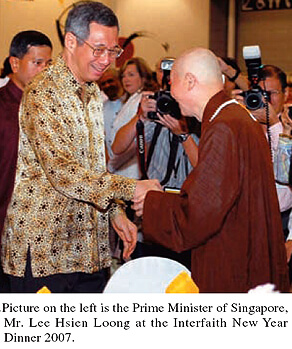
A Chinese proverb says, “Education is essential in building a country and in guiding its people.” In order for religious cooperation to last for a long time, it must be based on learning each other’s teachings. The objective of the teachings of all sages, in every country throughout time, is “compassion, lovingkindness, sincerity, respectfulness, humility, and harmony.” Looking around the world today, we see that many religious followers are not truly studying and practising their religious tenets. Instead, they are used by people with evil purposes and instigated to cause conflicts and confrontations as well as social turmoil.
This is quite sad. People generally not only have misunderstandings about religions, but they also disdain ethics and morality. As a consequence, the whole world is in disorder, with accelerating rates of crimes and suicides committed by younger and younger people. These phenomena have caused deep concerns and distress.
Therefore, if we wish to unite religions, we must first pay special attention to the study of religious texts, in order to deeply understand their meanings and to propagate them widely. Religious followers should pay attention to practising the sacred teachings in daily life and not just go through formalities. Moreover, each religion should learn from and understand other religions, while seeking common ground and putting aside differences. By doing this, religions can get along harmoniously, and exist and flourish side by side.
I have been learning the sages’ teachings for fifty-six years. I deeply feel that if one wishes to look for a place to live peacefully in this era, one must study the sages’ texts everyday without slacking off. From my learning, I have come to understand that the core of the teaching of all sages, in this world and beyond, is sincere loving-kindness. Through the teaching of ethics, morality, the law of cause and effect, wisdom, and science, the sages aim to uncover the virtues of purity and pure virtuousness innate in all sentient beings. This way, these virtues will manifest in these beings’ interacting with others and engaging in daily tasks.
Hinudism states “Resolve anger with compassion, and counter evil with virtuousness.” The Qu’ran emphasises “Allah is indeed loving.” The Bible proclaims “God loves all people.” Confucius promotes lovingkindness, and Mencius advocates righteousness. Judaism says “The most wonderful thing one can do is to forgive others’ faults.” Buddhism teaches “Compassion is the essence, and expediency is the means.” All of the sages teach us to maintain a good heart, do good deeds, say good words, and be a good person.
Going a step further, we expand our sincere loving-kindness to encompass everything in the universe so that we can get along in harmony, and with mutual respect and love, with all sentient beings in different dimensional spaces. In doing this, we can truly achieve the ideal of human happiness and a harmonious society.
In the 1970s, the English historian philosopher Professor Arnold Toynbee once said that to solve the social problems of the 21st century, one must rely on the thoughts of Confucius and Mencius, and on Mahayana Buddhism.” As a matter of fact, the morality that the sages taught is the eternal truth, which surpasses time and space. It is not worthless and old-fashioned as considered by some shallow-minded people. When we look at the leaders in every country throughout time, we discover that if a leader skilfully uses religious teaching and the teaching of morality to purify people’s minds and improve social moral standards, then the country will enjoy an honest government, a harmonious society, and everlasting peace and stability.
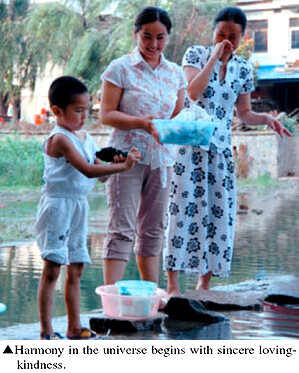
An ancient Chinese said, “In a village of one hundred families, if ten people abide by the Five Precepts, we will have ten kind, honest, and cautious people. In a city of one thousand families, if one hundred people abide by the Ten Virtuous Conducts, we will have one hundred people who can get along harmoniously with others. If we can promote this teaching to the entire country of one hundred million households, we will have a million virtuous people. When a person practises one good act, that person is not committing a bad act. One bad act not committed means one less punishment to be administered. If a punishment does not need to be administered to a family, then ten thousand punishments do not need to be administered nationwide.
Yes, indeed, you can just sit and enjoy a peaceful country.” Therefore, uniting religions, realising religious teaching, and promoting moral education to all people are unignorable, important forces for conflict reconciliation and world harmony.
Take China, a country with five thousand years of history, as an example. The three teachings of Confucianism, Buddhism, and Taoism have melded together and are deeply ingrained in people. At a very young age, children learned to do housework and interact with people, which is education in life. This laid the foundation for their moral integrity. The classics they studied in school and the art performances they attended after they entered society all taught the intrinsic values of filial piety, fraternal love, loyalty, trustworthiness, courtesy, justice, honesty, honour, kindness, love, harmony, and fairness. This way, people would be pure in mind and honourable. This is the reason why China has enjoyed ever-lasting peace and stability for five thousand years.
Fundamental to the traditional culture are Confucianism’s The Standards for Being a Good Student and Child, Buddhism’s Ten Virtuous Deeds Sutra, and Taoism’s Accounts of Request and Response. These were required courses in the past and are still very practical today. They explain profound principles in simple language, making them easy to practise. These books deserve diligent learning and wide propagation.
Essential to education are teachers. In teacher training, teaching by setting a good example with behaviour is more effective than teaching by words. Educators should know that only through diligent practice of the sages’ teachings and of ethical and moral standards can they truly influence others. From the experiment to significantly restore good social values in Tangchi, Lujiang, within one year, we thoroughly understand that one of the reasons for such remarkable improvement is that teachers at the centre truly practised the teachings in The Standards for Being a Good Student and Child and set good examples with their own behaviours.
Today, chaos occurs globally. Only education can save the world. We strongly believe that the sages’ teaching of morality can, both for the time being and permanently, effectively and efficiently reconcile all conflicts and contradictions, and restore world stability and peace. The ancient Chinese said, “We should pass on the teachings of ancient sages and achieve peace for future generations.” They also said “Continue the wisdom-life of the Buddha and propagate the Dharma to benefits all sentient beings.” Now is the time for every one of us sitting in this hall! It is imperative to train high-levelled propagators of various religions and master teachers of ethics and morality. We hope that the sages’ teachings will spread widely and will be passed on forever. This is the very root of human happiness and world stability!
As to implementation, I suggested at UNESCO Headquarters conference in Paris last October that, as religious cooperation has been realised in Singapore, the next step was to establish a religious university. First, we should start by setting up an institute of religions to train teachers, and then we should establish a university of religions or a multicultural university. Courses in ethics, morality, religious texts, the law of cause and effect, science, and so on, should be run to train high-level propagators. Each religion should establish its college. Each college should have both common courses and specialist courses. In addition to specialising in the texts of his or her religion, a student can also study the teachings of other religions.
After being assessed and endorsed by the government as being truly beneficial to social harmony and stability, lectures can be broadcast to religious followers throughout the entire country and even around the world through the Internet and satellite television. I sincerely hope that the Singapore government and leaders of various religious groups will work together to promote the sages’ teachings and moral education to all people. In this way, the good teachings will prevail, and evil teachings will naturally disappear. People all over the world will be led towards happiness, and social stability and world harmony will be achieved! I present my humble view to Your Excellency Mr. Deputy Prime Minister and the religious representatives. Any comments will be greatly appreciated.
I wish you all good health and happiness!
Thank you.
Ven. Prof. Shi Chin Kung AM, Hon. PhD
President of Pure Land Learning College, Australia
Honorary Professor of University of Queensland, Australia
Honorary Professor of Griffith University, Australia
